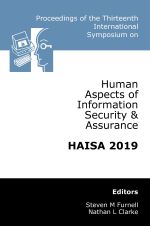In 2014, we launched our open-access repository which offers full text access to conference proceedings from many of our events including the INC and HAISA series. These papers are free to access and distribute (subject to citing the source).
» Openaccess proceedings » Thirteenth International Symposium on Human Aspects of Information Security & Assurance (HAISA 2019)
 | Thirteenth International Symposium on Human Aspects of Information Security & Assurance (HAISA 2019) |
Title: Evaluating User Perception of Multi-Factor Authentication: A Systematic Review
Author(s): Sanchari Das, Bingxi Wang, Zachary Tingle, Linda Jean Camp
Reference: pp166-178
Keywords: Authentication, Multi-Factor Authentication, Passwords, Systematic Literature Review, User Studies, User Experience, User Evaluation, Human-Factors.
Abstract: Security vulnerabilities of traditional single factor authentication has become a major concern for security practitioners and researchers. To mitigate single point failures, new and technologically advanced Multi-Factor Authentication (MFA) tools have been developed as security solutions. However, the usability and adoption of such tools have raised concerns. An obvious solution can be viewed as conducting user studies to create more user-friendly MFA tools. To learn more, we performed a systematic literature review of recently published academic papers (N = 623) that primarily focused on MFA technologies. While majority of these papers (m = 300) proposed new MFA tools, only 9.1% of papers performed any user evaluation research. Our meta-analysis of user focused studies (n = 57) showed that researchers found lower adoption rate to be inevitable for MFAs, while avoidance was pervasive among mandatory use. Furthermore, we noted several reporting and methodological discrepancies in the user focused studies. We identified trends in participant recruitment that is indicative of demographic biases.
Download count: 940
How to get this paper:


PDF copy of this paper is free to download. You may distribute this copy providing you cite this page as the source.
